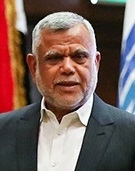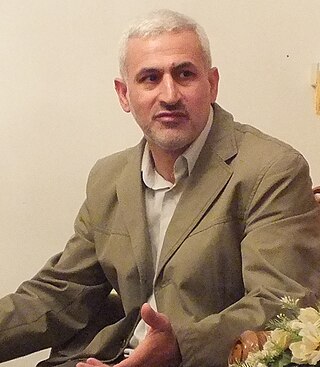Related Research Articles

Izzat Ibrahim al-Douri was an Iraqi politician and army field marshal. He served as Vice Chairman of the Iraqi Revolutionary Command Council until the 2003 U.S. invasion of Iraq and was regarded as the closest advisor and deputy under President Saddam Hussein. He led the Iraqi insurgent group Naqshbandi Army.

Imad Fayez Mughniyeh, alias al-Hajj Radwan, was a Lebanese militant leader who was the founding member of Lebanon's Islamic Jihad Organization and number two in Hezbollah's leadership. Information about Mughniyeh is limited, but he is believed to have been Hezbollah's chief of staff and understood to have overseen Hezbollah's military, intelligence, and security apparatuses. He was one of the main founders of Hezbollah in the 1980s. He has been described as "a brilliant military tactician and very elusive". He was often referred to as an ‘untraceable ghost’.

Ayad Allawi is an Iraqi politician. He served as the vice president of Iraq from 2014 to 2015 and 2016 to 2018. Previously he was interim prime minister of Iraq from 2004 to 2005 and the president of the Governing Council of Iraq in 2003.

The Islamic Revolutionary Guard Corps, also called Sepah or Pasdaran, is a multi-service primary branch of the Iranian Armed Forces. It was officially established by Ruhollah Khomeini as a military branch in May 1979, in the aftermath of the Iranian Revolution. Whereas the Iranian Army protects the country's sovereignty in a traditional capacity, the IRGC's constitutional mandate is to ensure the integrity of the Islamic Republic. Most interpretations of this mandate assert that it entrusts the IRGC with preventing foreign interference in Iran, thwarting coups by the traditional military, and crushing "deviant movements" that harm the ideological legacy of the Islamic Revolution. Currently, the IRGC is designated as a terrorist organization by Bahrain, Saudi Arabia, Sweden and the United States.

Hadi al-Amiri is the head and secretary general of the Badr Organization, a Shiite organization based in Iraq, he heads the Shiite political organization Badr and his armed group, the Badr Brigade.

The Quds Force is one of five branches of Iran's Islamic Revolutionary Guard Corps (IRGC) specializing in unconventional warfare and military intelligence operations. U.S. Army's Iraq War General Stanley McChrystal describes the Quds Force as an organization analogous to a combination of the CIA and the Joint Special Operations Command (JSOC) in the United States. Responsible for extraterritorial operations, the Quds Force supports non-state actors in many countries, including Hezbollah, Hamas, Palestinian Islamic Jihad, Yemeni Houthis, and Shia militias in Iraq, Syria, and Afghanistan. According to Michael Wigginton et al., the Al-Quds Force is "a classic example of state-sponsored terrorism."

Mohammad Hossein-Zadeh Hejazi was an Iranian military commander in the Islamic Revolutionary Guard Corps.
Jeish Muhammad is an Iraqi militant group that is both politically and religiously motivated. The politically motivated faction within JM is primarily made up of former Ba'athist members mainly from the Sunni region. Many who enjoyed special status during the leadership of Saddam Hussein were from Tikrit, which is in turn within an area of Iraq where the Arab population is mostly Sunni. People who generally hold the ex-vice-president, Izzat Ibrahim ad-Douri, in exceptionally high esteem were members of the security, intelligence and police forces from the previous government.
Since the Iranian Revolution in 1979, the government of the Islamic Republic of Iran has been accused by several countries of training, financing, and providing weapons and safe havens for non-state militant actors, such as Hezbollah in Lebanon, Hamas in Gaza, and other Palestinian groups such as the Islamic Jihad (IJ) and the Popular Front for the Liberation of Palestine (PFLP). These groups are designated terrorist groups by a number of countries and international bodies such as the EU, UN, and NATO; however, Iran considers such groups to be "national liberation movements" with a right to self-defense against Israeli military occupation. These proxies are used by Iran across the Middle East and Europe to foment instability, expand the scope of the Islamic Revolution, and carry out terrorist attacks against Western targets in the regions. Its special operations unit, the Quds Force, is known to provide arms, training, and financial support to militias and political movements across the Middle East, including Bahrain, Iraq, Lebanon, Palestine, Syria, and Yemen.

Qasem Soleimani was an Iranian military officer who served in the Islamic Revolutionary Guard Corps (IRGC). From 1998 until his assassination by the U.S. in 2020, he was the commander of the Quds Force, an IRGC division primarily responsible for extraterritorial and clandestine military operations. In his later years, he was considered by some analysts to be the right-hand man of the Supreme Leader of Iran, Ali Khamenei, as well as the second-most powerful person in Iran behind him.

Hasan Ali Turkmani was a prominent Syrian military commander and Arab Socialist Ba'ath Party member. He served as the Minister of Defense in Syria from 2004 to 2009.

Mustafa Badreddine, also known as Mustafa Badr Al Din, Mustafa Amine Badreddine, Mustafa Youssef Badreddine, Sami Issa, and Elias Fouad Saab, was a military leader of Hezbollah and both the cousin and brother-in-law of Imad Mughniyah. He was nicknamed Dhu al-Fiqar referring to the legendary sword of Imam Ali. His death is seen as one of the biggest blows in the Hezbollah leadership.

The Islamic Republic of Iran and the Syrian Arab Republic are close strategic allies, and Iran has provided significant support for the Syrian government in the Syrian civil war, including logistical, technical and financial support, as well as training and some combat troops. Iran sees the survival of the Syrian government as being crucial to its regional interests. When the uprising developed into the Syrian Civil War, there were increasing reports of Iranian military support, and of Iranian training of the National Defence Forces both in Syria and Iran. From late 2011 and early 2012, Iran's IRGC began sending tens of thousands of volunteers in co-ordination with the Syrian government to prevent the collapse of the Syrian Arab Army; thereby polarising the conflict along sectarian lines.

The Iranian intervention in Iraq has its roots in the post-2003 invasion of Iraq by the United States and allies when the infrastructure of the Iraqi armed forces, as well as intelligence, were disbanded in a process called "de-Ba'athification" which allowed militias with close ties to Tehran to join the newly reconstituted army.

Jamal Ja'far Muhammad Ali Al Ibrahim, known by the kunyaAbu Mahdi al-Muhandis was an Iranian-Iraqi commander of the Popular Mobilization Forces (PMF). At the time of his death, he was deputy chief of the PMF and regarded as one of Iraq's most powerful men.
The Iranian Cyber Army is an Iranian computer hacker group. It is thought to be connected to the
Liwa al-Quds or the Jerusalem Brigade is a predominantly Syrian Palestinian brigade that operates as a part of pro-Syrian government forces in the Syrian Civil War. Since 2019, it is part of the Syrian Army's 5th Assault Corps. It was formed in 2013 by the engineer Muhammad al-Sa'eed. The fighters who call themselves the 'Syrian Arab Army Fedayeen' are active in Aleppo and Daraa. The brigade is composed of Sunni Palestinians from the al-Nayrab district and the former refugee camp Handarat as well as reconciled rebels.

Hassan Shateri, also known as Hesam Khoshnevis, was an Iranian military officer and Major General of Iran's elite IRGC Quds Force. He was a veteran of the Iran–Iraq war and head of the Iranian Committee for the Reconstruction of Lebanon after the 2006 Lebanon War, according to Iranian media. He was assassinated in February 2013.

The Guardians of Syria Forces - Lions of Hussein, formerly known as Lions of Hussein Brigade and often shortened to Lions of Hussein, are an Alawite militia which fights for the Ba'athist government during the Syrian Civil War. The unit originates as Shabiha, a criminal organization that has operated in Latakia Governorate since the 1980s, and only adopted its current name and appearance in 2015. Since then, the Lions of Hussein reportedly continued their "criminal activities on the side".

Esmail Qaani is an Iranian brigadier general in the Islamic Revolutionary Guard Corps and commander of its Quds Force — a division primarily responsible for extraterritorial military and clandestine operations. Leader of Iran Ali Khamenei appointed Qaani to succeed Qasem Soleimani as Commander of the Quds Force.
References
- ↑ "Iran creates 'Cyber Brigades' for online war". Al Arabiya. December 5, 2016.
Al Arabiya.net has previously revealed in a special report published last September, the assassination of 35-year-old Tajik, the former commander of the 'Cyber Army' of the Ministry of intelligence after he was accused of spying and purveying security information to opposition activists of the 'Green Movement.' Tajik was also a member of the intelligence units of the Islamic Revolutionary Guard Corps (IRGC) and Quds Forces.
- 1 2 Hamid, Saleh (January 15, 2017). "Secret details emerge on Iran's Cyber Army". Al Arabiya . Retrieved January 18, 2017.
- ↑ "Iranian cyber manager assassinated". Arutz Sheva . January 10, 2016. Archived from the original on January 18, 2017.
Mohammed Hussein Taj'eek, the cyber manager of the Iranian "Army of the Guardians", was assassinated in his home.